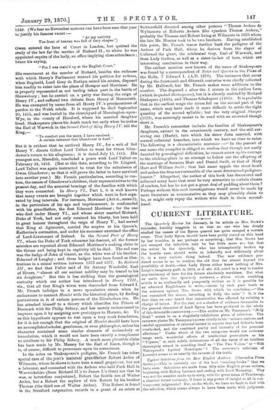CURRENT LITERATURE.
The Quarterly Review for January, in its article on Mrs. Stowe's rejoinder, forcibly suggests to us that no one who has deeply
studied the causes of the Byron quarrel has quite escaped a certain
craze. That Lady Byron should have been partly crazed on this head by her troubles, is sot perhaps so surprising ; that Mrs. Stowe has not escaped the infection, may be but little more so ; but that the writer in the Quarterly, who has triumphantly broken up the hostile case, should write so inflatedly and deliriously about
it, is a very curious thing indeed. The new evidence pro- duced seems to us to confirm the old thus far almost beyond the possibility of doubk—that Lady Byron either knew nothing of Mrs. Leigh's imaginary guilt in 1816, or if she did, acted in a way to render any-testimony of hers for the future absolutely worthless. But what on earth does the Quarterly reviewer,— whose whole rambling article is as confusedly and pompously written as it is possible for an educated Englishman to write,—mean by such pure trash as the sentence against Mrs. Stowe with which he concludes,—" She has canonized the sinner, intending to deify the saint "? It is the first time we over heard that canonization was effected by refuting a charge of incest. For the rest, not a shadow of evidence favourable to the general character of Lord Byron has been produced in the whole of this detestable controversy.—The article on Mr. Tennyson's "Holy Grail" seems to us a singularly infelicitous piece of criticism. The reviewer places Mr. Tennyson's power chiefly in his "minute, various, and careful appreciation of external nature in aspects that had hitherto been overlooked, and the combined purity and intensity of his personal affections." Under which of the two categories would the reviewer range such wonderful efforts of intellectual portraiture as his "Ulysses," or such subtle delineations of all the turns of an intellect thoroughly versed in sounding itself as "The Two Voices" or "Will Waterproof's Lyrical Monologue" ? The reviewer's criticism of Lancelot seems to us exactly the reverse of the truth.


































 Previous page
Previous page